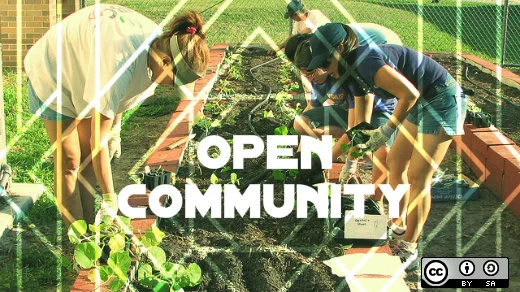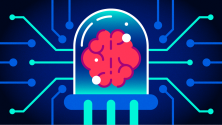As your brain develops, you learn about what you can and should do in the world, and what you can't and shouldn't. Your actions are influenced by surroundings and norms, and many times what keeps you from participating is a lack of self-confidence.
Throughout our lives, we've been taught the "rules" in civil discourse and social behavior. We've been taught that that the speaker is notable, that the CEO has vision, that the teacher is the expert, that the police maintain control, that respect means being quiet and letting others have the floor, and if someone is wrong, gently speaking up, but only in certain situations—it's all a bit complicated.
When participating in open source, self-confidence plays a huge role. Open source communities are inherently participatory. Participation is a currency in the open source world and that currency is contingent on self-confidence. The more you participate, hone your skills, network, and share your ideas and insights, the more you are able to improve the projects you commit to. All of these things require the belief that you have something valuable to share, and guess what, you do.
Here's a truth: All of us have something valuable to share. Finding out what that thing is and where our sharing it makes the most positive impact is the point.
Reflecting on this list will help you develop your self-confidence and make forging ahead in the open source community easier.
No one thinks about you as much as you think about yourself
Reminding yourself that you are in control and that the judgement of others is likely nonexistent can help you gain self-confidence.
We've been conditioned to understand that people around us are judging us for our actions. This conditioning is a byproduct of learning how to function as social creatures. Likely, it started in childhood when our parents implemented reward systems for how we acted. It continued into adolescence when teachers literally judged our performance and awarded grades and marks, comparing us to others. These systems of motivation and reward caused our brains to establish feedback loops that included self-reflection. We needed to determine if we would get the cookie and prepare ourselves for that eventuality.
Today, we wonder, "What does this person think about me?" because of this, but the secret is that most people don't spend much time judging you. All of us are thinking about our own cookies. We each have our own ambitions to follow and our own problems to solve. Other people are busy worrying about how they affect people around them, and they aren't paying much attention to you. They likely don't notice if you make mistakes or talk too loud or recede into the background. All the doubts you have about yourself are in your head, not in anyone else's.
Our desire to be accepted is part of what it means to be human, but acceptance comes at the whim of the person across from us. That person lacks the context of who we are, where we came from, the experiences that shaped us. we have no control. However, we can hope to influence this person through communication.
In the community-intense world of open source, remembering that people are not thinking about you is especially important. Expect that your peers and mentors are concerned with other projects or community members.
Once you acknowledge this, embrace the world of proactive communication. Ask for help, tell people what you need, and point out your contributions and remind people that you are there and that you are an active participant in an open community. Both your open source credibility and your self-confidence will improve when people start coming to you, instead of the other way around.
People love to share what they know
Any successful open source community is a teaching and learning community. To get started in open source, not only do you need to be forthcoming with your own knowledge, you need to soak up the lessons other people have to offer. Fortunately, we humans love to share what we know.
Think about how you feel when someone else asks you for your opinion. Knowing that someone values what you have to say is like a shot of sugar to your Id and Ego.
As children, our physical brains are not developed enough for us to place ourselves into the larger context of the world and reality. We believe that we are the center of the universe. The majority of our cognitive function develops before we are six years old. During that time our parents respond to our cries and adults everywhere fulfill our desires. We are given evidence that we are the most important thing in the universe.
Our neural pathways are established during this time, and our egos develop. As we learn to participate in social and civic life, little by little we learn that we aren't the center of the world. However, the initial justifications our egos made don't fully vanish. Understanding the importance of the ego in our social atmospheres can help you connect and relate to people.
Working in collaboration and seeking out learning experiences will help you hone and develop both your social and technical skills. Constant learning is absolutely integral to advancing in the world of open source.
What does this have to do with confidence? Not only do you work to improve someone else's confidence by showing them that you value this person's knowledge and input, you develop your own. There will be a moment when you become more flexible. You will at some point admit you don't know something.
Confident people can say "I don't know" without an air of disappointment.
You reap what you sow
You've heard the phrase "Fake it, 'til you make it"? Well, confidence is like many psychological phenomena. Actively telling yourself that you are smart, funny, interesting, talented, a good communicator, a good friend, unique, knowledgeable, a quick study, an introspective thinker, or whatever other aspect you want to be, will eventually result in you persuading yourself that this is true. And if it's true for you, it becomes true for other people.
Call it the practice of self-affirmation.
Additionally, in the world of open source how you think about and treat others is how they will think about and treat you. The Golden Rule is once again valid. If you want to be successful in open source, you have to be confident enough to stand up for what you believe in, but do so in a way that is welcoming and inclusive to other perspectives and opinions. The mark of a leader is someone who models the behaviors they want to see in the world, whether anyone else follows suit or not.
Do you have other ways to develop confidence? Let us know in the comments!







4 Comments